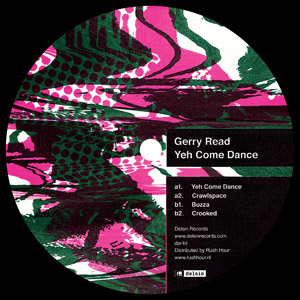Gerry Read Yeh Come Dance EP
When you take into account Gerry Read‘s hasty, improvised production methods (which he gave us […]

When you take into account Gerry Read‘s hasty, improvised production methods (which he gave us some insight into a few weeks back), his prolific nature doesn’t necessarily come as a surprise. Still, it is a bit of a wonder how the young producer manages to put together such an abundant output while continuing to increase the quality of his music. The Yeh Come Dance EP, Read’s debut for Amsterdam’s Delsin imprint, picks up where his Fourth Wave trilogy left off, in the abstract remnants of Midwest house and techno. However, this time around, his crackling compositions appear with rounded edges, and his sights are more focused on the dancefloor than ever before.
Across Read’s string of releases in 2011, an image appeared of a producer still working to solidify his sound. Starting in the depths of loose, static-laden house, the Englishman slowly began to brush off the layers of dust as the year progressed. With the Yeh Come Dance EP, we hear Read’s productions as clear and up front as they’ve ever been. Make no mistake, the songs are still tinged with bits of distortion and hiss, but nonetheless display a crisper, punchier sound overall. This is particularly true of the release’s two standout tracks, “Crawlspace” and “Crooked,” a pair of raw house tunes that rely on heavy drum sounds and full, rolling basslines. The former, which appears as the second offering on the EP, begins with a few simple hi-hat and percussion patterns and a crunchy kick that pushes along an almost funky—albeit slightly sudbued—synth bass. As “Crawlspace” rolls forward, it begins more and more to resemble some mutated form of Chicago house, layering in filtered chords and barely distinguishable vocal samples. It’s a fine example of what makes Read’s tunes so irresistible; the cuts and chops may be loose, but the vibes are pure and the grooves are thick.
The four-track EP’s other two efforts steer towards the abstract side of house, with both the title track and “Bozza” combining samples that seem like they barely fit together. Still, Read somehow manages to draw a line between the disparate sound sources, weaving them together to yield bubbling, percussive pieces of adventurous house. These two cuts are noticeably mellower than their counterparts, but the aim is still to make bodies move, only with less of an overt drive. Building around and on top of a single loop, the tracks seem ready to engulf the listener in a bed of rhythm.
Due as much to the now-20-year-old’s secretive persona as it is to the fact that he seems unable to stand still in his production aims, Gerry Read’s path is not one that’s easy to map. Nevertheless, the underlying constant in his work continues to be the infusion of Midwestern soul, a trend that once again rings true on Yeh Come Dance. Considering that all four of its songs present house grooves that feel genuinely effortless while employing textures that are increasingly dense and rich, Read’s predilection for creating innovative tunes while channeling classic sounds is hard to miss.

